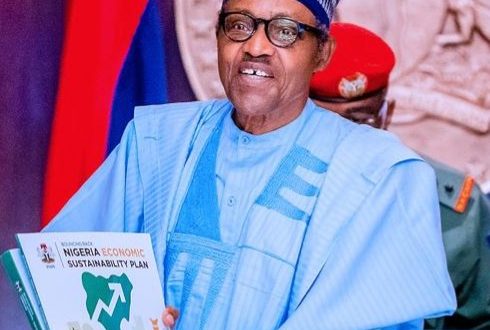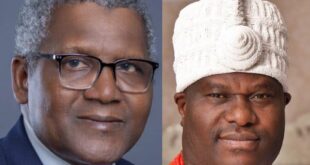
ABUJA: President Muhammadu Buhari has described the work of the Osinbajo led-Economic Sustainability Committee (ESC) as a “National Plan,” while stating that the administration is focused on implementing its recommendations, which includes massive Federal Government support for local production, manufacturing, significant support for the informal sector and MSMEs and the expansion of the Social Investment Programme to provide succour to more Nigerians.
“I’m pleased to hear that the Economic Sustainability Committee consulted with all the National Economic Councils and the National Assembly, and I look forward to our continued partnership with one focus to implement what I consider a national plan,” the President noted.
While congratulating the Osinbajo-led Committee for completing this critical national assignment in good time, President Buhari said the focus of the Plan would help stimulate the economy, while also creating millions of jobs especially for youths through massive programmes in the agriculture and agro-allied sectors, and other sectors of the economy.
The President stated this on Thursday at the Council Chambers when he received the ESC’s plan entitled “Bouncing Back: The Nigerian Economic Sustainability Plan.” The Vice President said the Committee was motivated by President Buhari’s “directive to come up with a Plan that would to provide succour to Nigerians, taking into account the dangers posed to the economy by the global economic slowdown, which also resulted in a drastic fall in crude oil production and prices, with serious implications for government revenues and foreign exchange earnings.”
Prof. Osinbajo was asked by Mr. President to chair the ESC to develop a clear Economic Sustainability Plan in response to challenges posed by the COVID-19 pandemic. Since then, the VP has chaired several meetings with members of the Committee, National Assembly leadership, State Governors, the Presidential Economic Advisory Council (EAC), among others.
Speaking after receiving the ESC plan from the VP, President Buhari said the Committee was established because “during these uncertain times, the government saw the need to act quickly and avert the worst; while government continues to seek ways of supporting businesses and industry.
The President added that the administration is determined “to support business especially sectors facing difficulty as the effect of the COVID-19 pandemic and the resultant socio-economic lockdown”, while it focuses on implementing the recommendations of the national plan.
The President stated that the recommendations in the plan would help in developing “a truly competitive economy that can support our people and secure our future.”
“I congratulate the Economic Sustainability Committee for completing this critical national assignment in good time,” he added.
He also commended Nigerians for their resilience in adapting to the COVID-19 pandemic, as well as the efforts of health workers whom he said, “continue to play critical role in keeping our country safe.”
Speaking on the plan presented to the President, VP Osinbajo stated that, “We are confident that if the proposals are taken as a whole and implemented conscientiously, Nigeria will avert the worst of the impending economic headwinds, and covert this crisis to a victory for the Nigerian economy.”
The VP noted that the Committee decided on a strategy hinged on President Buhari’s mantra to “produce what we eat and consume what we produce”.
Prof. Osinbajo added, “In other words, to create millions of new jobs, we need to focus on encouraging local production, local services, local innovation, and emphasize the use of local materials. Nigeria and Nigerians can produce our food, build our houses and construct our roads, using local materials in all cases. If we must import, it must be to support local production. We have therefore recommended that we must carry out mass programmes that create jobs and utilise local materials.”
Major highlights and recommendations of the Osinbajo ESC plan include:
• Strategy hinged on Mr. President’s mantra to “produce what we eat and consume what we produce”. In other words, to create millions of new jobs, we need to focus on encouraging local production, local services, local innovation, and emphasize the use of local materials
• A Mass Agricultural Programme; which is expected to bring between 20,000 and 100,000 hectares of new farmland under cultivation in every State of the Federation and create millions of direct and indirect job opportunities.
• Extensive Public Works and Road Construction Programme focusing on both major and rural roads and using locally available materials like limestone, cement and granite.
• Mass Housing Programme to deliver up to 300,000 homes annually, engaging young professionals and artisans who form themselves into small and medium scale businesses within the construction industry, using indigenous labour and materials.
• Installation of Solar Home System, targeting 5 million households, serving about 25 million individual Nigerians who are currently not connected to the National Grid.
• Support for local production and manufacturing of all that is possible, including tech apps, software, shoes, garments, steel fabrication, ceramics and furniture, with the required capital and essential machinery.
• The provision of ample support for the informal sector through low interest loans and by easing procedures for registration, licensing, obtaining permits, etc. By these means, urban and informal business people like mechanics, tailors, artisans, and petty traders, will be encouraged to improve and develop their services.
• Support for MSMEs, especially in assisting to restructure their loans with banks. Among others, this will assist businesses in the pharmaceutical, aviation, hotels and the hospitality industry, private schools, road transportation, technology companies, and the creative industry, amongst others.
• Facilitation of broadband connectivity across the country and creation of a wide variety of technology and ICT jobs.
• Expansion of the Social Investment Programme, through an increase in the number of cash transfer beneficiaries, N-Power volunteers and sundry traders enjoying small and micro loans through the MarketMoni and TraderMoni schemes. The pre-existing conditional cash transfer will also be extended to cover a larger number of the extremely poor.
 Startrend International Magazine For Your Latest News And Entertainment Gists
Startrend International Magazine For Your Latest News And Entertainment Gists





